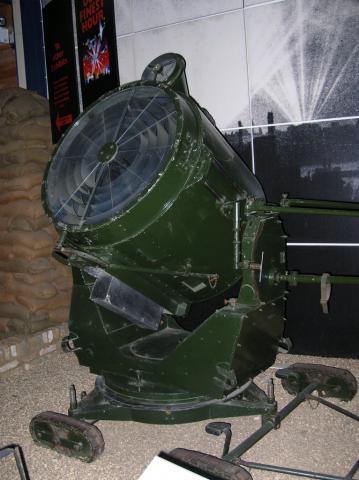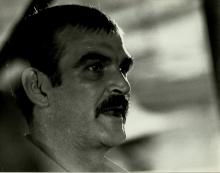Anti Aircraft Searchlight (AASL) sites in Hong Hong
Primary tabs
Map of AASL sites in Hong Kong
[Click any marker to see its name. Click the name for more details, and to see if we have any photos of the site. The marker's colour shows the current condition of the site: Red=demolished, Yellow=ruin, Blue=unknown.]
Background
The Anti Aircraft Searchlight (AASL) used in Hong Hong was either a 90 or 120cm diameter carbon arc type projector, with 80 V DC electrical power supplied by a generator driven by a Lister diesel engine. There were two types of site: fixed, where the engine was kept onsite, and mobile, where the engine and generator were truck mounted. The lights were mounted on four small caterpillar type tracks, and were hand towed to their position.
The sites were permanent, usually with concrete buildings used to store the equipment and engine, as well as act as a living area for the crews. A crew consisted of 11 members who operated the lights, sound locators, and the engine. The engine shelter was built some distance from the site, to reduce noise interference with the sound locators. A flat, circular platform near the equipment shelter provided a base for the light, with a nearby power outlet connected by cable to the generator.
Before the review of HK Defence in 1938, sites were distributed on both the Mainland and HK Island, for a total of 36 sites, however after the decision to defend only HK Island, those on the Mainland were withdrawn and additional sites prepared on the Island. At the time of the war, there were 14 sites only. The lights were not used in their primary role during the battle.
Note: This is best information available at present (2016). Further information or corrections will be appreciated.



More about the AASL sites
I asked Rob about the difference between permanent, fixed, and mobile, and also why the sites weren't used for their primary purpose. He replies:
All sites were pre-built. Prior to the Policy change of 1938 there were a significant number of sites around the lower NT. After that date all were withdrawn to the Island and a number of new sites added to the existing ones there, so at commencement of hostilities there were 14 mostly fixed sites on the Island. (Included was one on Stonecutters and one on Green Island). The fixed sites all had a stores/accommodation building and at a suitable distance away another building housing the engine/generator. In peacetime, the men, and presumably the light and sound locators, were not kept on site, only activating the site for exercises. The men were billeted in Wellington Barracks. I have never found any of the mobile sites/remains but as they were listed in the Defence Plans at particular grid references, I assume there was at least the store/accommodation building. The engine/generator was truck mounted and as there were few mobile sites, presumably enough to supply all sites at the same time. The only mobile site I know of on the Island was the one at Repulse Bay. My presumption is that, because of the small area of the Island, they didn’t need the number of sites as previously necessary for Island and NT.
“The lights were not used in their primary role during the battle” is a direct quote from Lt. Col. Lamb in WO 106/2426. I presume because there were no night bombing attacks. They were used: for example Braemar AASL was moved and used as a Beach Defence light on the North Shore during the battle. Braemar isn’t listed on my database as I only have a very vague description of where its store was sited.